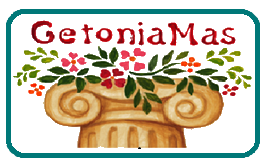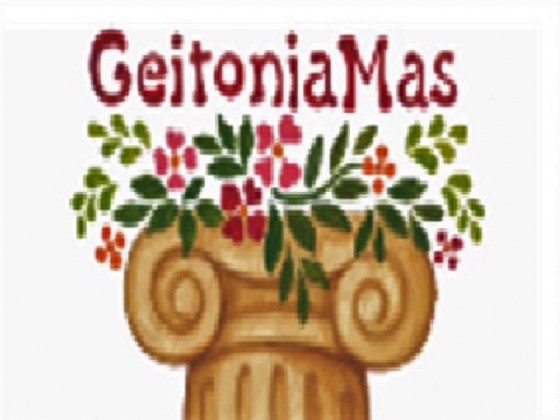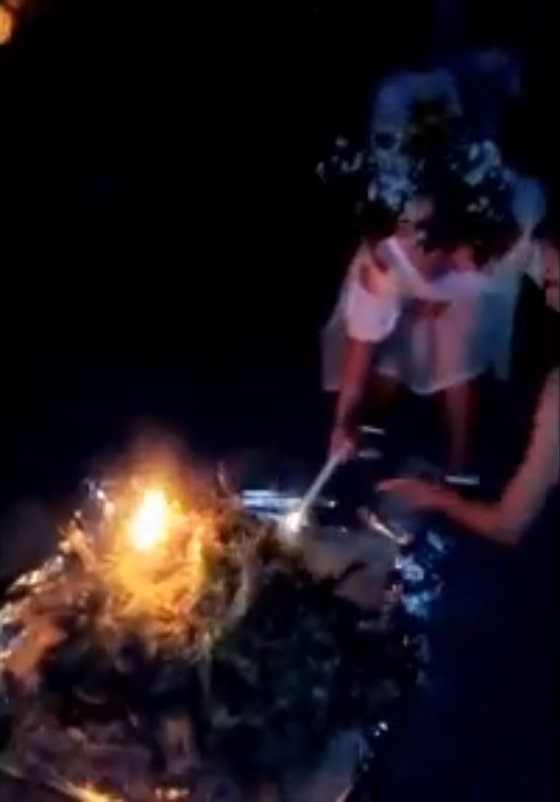 Getonia
Our Neighborhood
Getonia
Our Neighborhood
Ακολουθεί μια περιγραφή της "Geitonia Mas" που δημοσιεύτηκε τον Οκτώβριο του 2014 στον παλιό μας ιστότοπο geitoniamas.net. Σκοπεύουμε να παράσχουμε μια ενημερωμένη περιγραφή στο μέλλον που θα αντικατοπτρίζει τις μεταβαλλόμενες ανάγκες της εποχής μας. Λάβετε υπόψη ότι έχουν αφαιρεθεί από το άρθρο φωτογραφίες και εφαρμογές που εφαρμόστηκαν για φιλική προς τον χρήστη ανάγνωση.
Καλωσόρισες Στην "Γειτονιά Μας: Μια Σύντομη Περιγραφή
Φέτος η συμμετοχή σε γονείς και παιδιά ήταν πολύ μεγάλη.
Αυτό δείχνει την ανάγκη που έχει ο κόσμος στην παράδοση, γι’ αυτό πολλοί έφεραν και τα στεφάνια της Πρωτομαγιάς.
Έτσι, από το 2011 που αναβιώσαμε τη γιορτή/έθιμο του Θερινού Ηλιοστασίου, ο στόχος μας είναι να την διαμορφώσουμε ώστε να ξεχωρίσει σαν έθιμο και να υιοθετηθεί σαν μια Μαρουσιώτικη παράδοση ανεξάρτητα από συλλόγους και διάφορα άλλα.
Με λίγα λογία, να ανήκει στις καρδίες του κόσμου, διότι, μόνο έτσι διατηρείτε σωστά η κουλτούρα και ο πολιτισμός ενός τόπου.
Στόχοι:
- Να αναδείξει την ιστορικότητα και προ-ιστορικότητα της γιορτής, καθώς και τη διαχρονικότητα της Ελληνικής ιστορίας .
- Να αναδείξει την κοινωνική συλλογικότητα και προσπάθεια σαν κάτοικος μιας γειτονιάς με νέους θετικούς και ενεργούς ρόλους στα παιδιά τους.
-παράδειγμα: μητέρες και γιαγιάδες να βοηθούν να φτιάξουν τα στεφάνια και οι πατεράδες στο φτιάξιμο , συντήρηση και καθαρισμό της φωτιάς.
- Να αναδείξει μια νέα μορφή της γιορτής εμπλουτίζοντας συμβολικά με μια παρέλαση από λαμπαδηφόρους, «εννιά μούσες» και «Φύλακες του Φωτός».
- Να δείξουμε πως εύκολα μπορούμε να δημιουργήσουμε κάτι νέο και θετικό σε μια «γερασμένη χώρα».
Οι παραδόσεις ανήκουν στην καρδιές του κόσμου και εκφράζουν την τοπική κοινωνική συλλογικότητα.
Στην περίπτωση του Κάψιμο του Μάη η γιορτή είχε πολλές αλλαγές, ώστε να συνεχιστεί να γιορτάζεται μέχρι σήμερα. Πάει πίσω 10,000 χρονιά; Μπορεί, αλλά σίγουρα τουλάχιστον σαν γιορτή γονιμότητας την ημέρα του θερινού ηλιοστασίου μαζί με τις μάντισσες πάει πίσω τουλάχιστον 5,000 χρονιά.
Στην σύγχρονη εποχή το έθιμο γιορτάζεται στη Ρουμανία, τη Ρωσία και σε άλλα μέρη.
Έτσι, πρέπει να γνωρίζουμε όλοι πως αξίζει να πάρουμε στα χεριά μας και να διαμορφώσουμε το παρόν για ένα καλύτερο μέλλον, για να ανήκει στις καρδίες μας!
Ευχαριστουμε:
Δημο Αμαρουσιου
Ποδηλάτες Paradise Trails
Smartphone Βίντεο Κάληψη
Σοφοκλής Μαγουλάς
Εθελοντές
Παναγιώτης Παπαδόπουλος
Στέλλα Βολυρακη
Παναγιώτης "army"
Μαρία Γκρίτζαλη
Γεωργιός Γκρίτζαλης
Μαναδες και Πατεραδες
Συμβουλές από
Ελένη Μανιακά
Γεωργία Μπίσκου
Από admin:
Αναστασια Χριστακου Γκριτζαλη
H Getonia.net ειναι μια υπό αναβάθμιση έκδοση της ιστοσελίδας geitoniamas.net.
Αναβαθμίσεις γίνονται συνεχώς σε ιστοσελίδες για να συμβαδίζουμε με την τεχνολογία. Στην περίπτωση της «Γειτονιά Μας» δεν γινόντουσαν οι αναγκαίες αναβαθμίσεις και ο λογος είναι πως η εταιρία που αγοράσαμε το σύστημα σταμάτησε να λειτούργει. Με αποτέλεσμα, χωρίς τις αναγκαίες αναβαθμίσεις να δυσλειτουργεί ολο το σύστημα της geitoniamas.net.
Έτσι, πήραμε την ευκαιρία να αναθεωρήσουμε και να σχεδιάσουμε μια νέα «Γειτονιά» Getonia.net! Πιο λειτουργική και δημιουργική. Ένα εργαλείο-κλειδί για κάθε γειτονιά και για μια όμορφη κοινωνία.
Twenty-five years on, I now describe myself as a recovering utopian. When the internet first appeared I was dazzled by its empowering, enlightening, democratising potential. It’s difficult to imagine today the utopian visions that it conjured up in those of us who understood the technology and had access to it. We really thought that it would change the world, slipping the surly bonds of older power structures and bringing about a more open, democratic, networked future.
We were right about one thing, though: it did change the world, but not in the ways we expected. The old power structures woke up, reasserted themselves and got the technology under control. A new generation of corporate giants emerged, and came to wield enormous power. We watched as millions – and later billions – of people happily surrendered their personal data and online trails to be monetised by these companies. We grimaced as the people whose creativity we thought would be liberated instead turned the network into billion-channel TV and morphed into a new generation of couch-potatoes. We saw governments that had initially been caught napping by the internet build the most comprehensive surveillance machine in human history. And we wondered why so few of our fellow citizens seemed to be alarmed by the implications of all this – why the world was apparently sleepwalking into a nightmare. Why can’t people see what’s happening? And what would it take to make them care about it?
Why not, I thought, compose 95 theses about what has happened to our world, and post them not on a church door but on a website? Its URL is 95theses.co.ukand it will go live on 31 October, the morning of the anniversary. The format is simple: each thesis is a proposition about the tech world and the ecosystem it has spawned, followed by a brief discussion and recommendations for further reading. The website will be followed in due course by an ebook and – who knows? – perhaps eventually by a printed book. But at its heart is Luther’s great idea – that a thesis is the beginning, not the end, of an argument.
Twenty-five years on, I now describe myself as a recovering utopian. When the internet first appeared I was dazzled by its empowering, enlightening, democratising potential. It’s difficult to imagine today the utopian visions that it conjured up in those of us who understood the technology and had access to it. We really thought that it would change the world, slipping the surly bonds of older power structures and bringing about a more open, democratic, networked future.
We were right about one thing, though: it did change the world, but not in the ways we expected. The old power structures woke up, reasserted themselves and got the technology under control. A new generation of corporate giants emerged, and came to wield enormous power. We watched as millions – and later billions – of people happily surrendered their personal data and online trails to be monetised by these companies. We grimaced as the people whose creativity we thought would be liberated instead turned the network into billion-channel TV and morphed into a new generation of couch-potatoes. We saw governments that had initially been caught napping by the internet build the most comprehensive surveillance machine in human history. And we wondered why so few of our fellow citizens seemed to be alarmed by the implications of all this – why the world was apparently sleepwalking into a nightmare. Why can’t people see what’s happening? And what would it take to make them care about it?
Why not, I thought, compose 95 theses about what has happened to our world, and post them not on a church door but on a website? Its URL is 95theses.co.ukand it will go live on 31 October, the morning of the anniversary. The format is simple: each thesis is a proposition about the tech world and the ecosystem it has spawned, followed by a brief discussion and recommendations for further reading. The website will be followed in due course by an ebook and – who knows? – perhaps eventually by a printed book. But at its heart is Luther’s great idea – that a thesis is the beginning, not the end, of an argument.
Twenty-five years on, I now describe myself as a recovering utopian. When the internet first appeared I was dazzled by its empowering, enlightening, democratising potential. It’s difficult to imagine today the utopian visions that it conjured up in those of us who understood the technology and had access to it. We really thought that it would change the world, slipping the surly bonds of older power structures and bringing about a more open, democratic, networked future.
We were right about one thing, though: it did change the world, but not in the ways we expected. The old power structures woke up, reasserted themselves and got the technology under control. A new generation of corporate giants emerged, and came to wield enormous power. We watched as millions – and later billions – of people happily surrendered their personal data and online trails to be monetised by these companies. We grimaced as the people whose creativity we thought would be liberated instead turned the network into billion-channel TV and morphed into a new generation of couch-potatoes. We saw governments that had initially been caught napping by the internet build the most comprehensive surveillance machine in human history. And we wondered why so few of our fellow citizens seemed to be alarmed by the implications of all this – why the world was apparently sleepwalking into a nightmare. Why can’t people see what’s happening? And what would it take to make them care about it?
Why not, I thought, compose 95 theses about what has happened to our world, and post them not on a church door but on a website? Its URL is 95theses.co.ukand it will go live on 31 October, the morning of the anniversary. The format is simple: each thesis is a proposition about the tech world and the ecosystem it has spawned, followed by a brief discussion and recommendations for further reading. The website will be followed in due course by an ebook and – who knows? – perhaps eventually by a printed book. But at its heart is Luther’s great idea – that a thesis is the beginning, not the end, of an argument.
Twenty-five years on, I now describe myself as a recovering utopian. When the internet first appeared I was dazzled by its empowering, enlightening, democratising potential. It’s difficult to imagine today the utopian visions that it conjured up in those of us who understood the technology and had access to it. We really thought that it would change the world, slipping the surly bonds of older power structures and bringing about a more open, democratic, networked future.
We were right about one thing, though: it did change the world, but not in the ways we expected. The old power structures woke up, reasserted themselves and got the technology under control. A new generation of corporate giants emerged, and came to wield enormous power. We watched as millions – and later billions – of people happily surrendered their personal data and online trails to be monetised by these companies. We grimaced as the people whose creativity we thought would be liberated instead turned the network into billion-channel TV and morphed into a new generation of couch-potatoes. We saw governments that had initially been caught napping by the internet build the most comprehensive surveillance machine in human history. And we wondered why so few of our fellow citizens seemed to be alarmed by the implications of all this – why the world was apparently sleepwalking into a nightmare. Why can’t people see what’s happening? And what would it take to make them care about it?
Why not, I thought, compose 95 theses about what has happened to our world, and post them not on a church door but on a website? Its URL is 95theses.co.ukand it will go live on 31 October, the morning of the anniversary. The format is simple: each thesis is a proposition about the tech world and the ecosystem it has spawned, followed by a brief discussion and recommendations for further reading. The website will be followed in due course by an ebook and – who knows? – perhaps eventually by a printed book. But at its heart is Luther’s great idea – that a thesis is the beginning, not the end, of an argument.
Τo getonia.net χρησιμοποιεί τα cookies για την σύνδεση του χρήστη, για στατιστικά στοχιεία και για να σας παρέχει την καλύτερη δυνατή εμπειρία χρήσης της ιστοσελίδας. Τα cookies χρησιμοποιούνται για τις βασικές λειτουργίες πλοήγησης αλλά και για την εξατομίκευση της εμπειρίας σας και δεν χρησιμοποιούνται για κανένα διαφημιστικό σκοπό.Δείτε την Πολιτική Προστασίας δεδομένων. | |
| Αν δεν πατήσετε συμφωνώ, δεν συλλέγονται οποιαδήποτε cookies. Συμφωνώ | |







